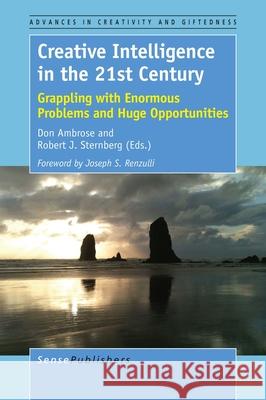Creative Intelligence in the 21st Century » książka
Creative Intelligence in the 21st Century
ISBN-13: 9789463005043 / Angielski / Miękka / 2016 / 286 str.
Creative Intelligence in the 21st Century
ISBN-13: 9789463005043 / Angielski / Miękka / 2016 / 286 str.
(netto: 235,83 VAT: 5%)
Najniższa cena z 30 dni: 236,46
ok. 22 dni roboczych.
Darmowa dostawa!
How can creative individuals and societies adapt to complex 21st-century conditions? Will civilizations thrive or collapse in the decades to come if they are not creative enough, or if they are too creative? Interest in these questions is growing; however, until now there has been inadequate understanding of the socioeconomic and cultural trends and issues that influence creativity. This book provides that understanding while yielding insights from many of the world's leading creativity researchers and educational experts. The book begins with a big-picture, interdisciplinary overview of the socioeconomic, cultural, and technological pressures emerging from 21st-century globalization and describes some ways in which those pressures simultaneously suppress, distort, and invigorate creativity in general, and creative education in particular. After that, prominent scholars of creativity and education use their impressive knowledge bases to clarify how we can adjust our thoughts and actions in order to give ourselves the best possible chances for success in this complex world. "The world's problems are complex, messy, and seemingly intractable, but history tells us that human creativity finds solutions to even the most daunting problems. This book collects perspectives on creative development from many of the most respected scholars and educators working in creativity and innovation today, helping chart a path forward for creativity in the 21st century." - Jonathan Plucker, Julian C. Stanley Endowed Professor of Talent Development, Johns Hopkins University "A volume taking on macro-opportunities and macroproblems by editors Ambrose and Sternberg is a treat for readers who want to think 'big' and think 'forward.' Kick back for an imaginative journey that reaches back to early global insights but propels us solidly into the 21st century and beyond." - Ann Robinson, Past President, National Association for Gifted Children
How can creative individuals and societies adapt to complex 21st-century conditions? Will civilizations thrive or collapse in the decades to come if they are not creative enough, or if they are too creative? Interest in these questions is growing; however, until now there has been inadequate understanding of the socioeconomic and cultural trends and issues that influence creativity. This book provides that understanding while yielding insights from many of the worlds leading creativity researchers and educational experts. The book begins with a big-picture, interdisciplinary overview of the socioeconomic, cultural, and technological pressures emerging from 21st-century globalization and describes some ways in which those pressures simultaneously suppress, distort, and invigorate creativity in general, and creative education in particular. After that, prominent scholars of creativity and education use their impressive knowledge bases to clarify how we can adjust our thoughts and actions in order to give ourselves the best possible chances for success in this complex world."The worlds problems are complex, messy, and seemingly intractable, but history tells us that human creativity finds solutions to even the most daunting problems. This book collects perspectives on creative development from many of the most respected scholars and educators working in creativity and innovation today, helping chart a path forward for creativity in the 21st century." - Jonathan Plucker, Julian C. Stanley Endowed Professor of Talent Development, Johns Hopkins University "A volume taking on macro-opportunities and macroproblems by editors Ambrose and Sternberg is a treat for readers who want to think big and think forward. Kick back for an imaginative journey that reaches back to early global insights but propels us solidly into the 21st century and beyond." - Ann Robinson, Past President, National Association for Gifted Children











